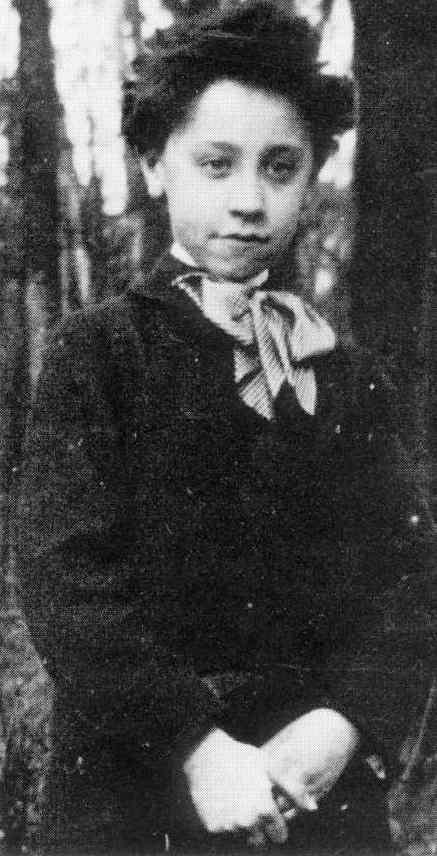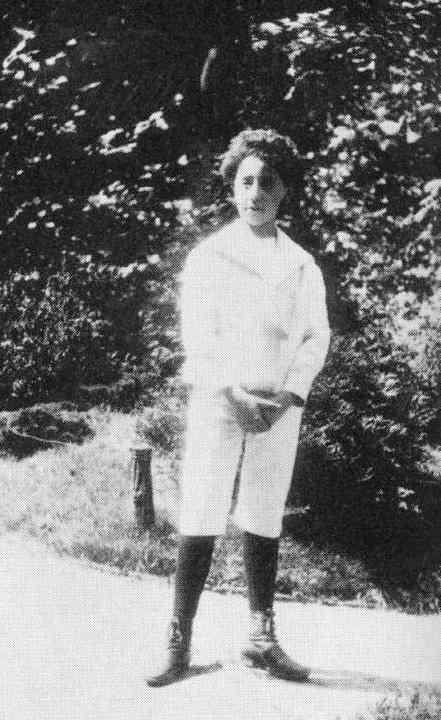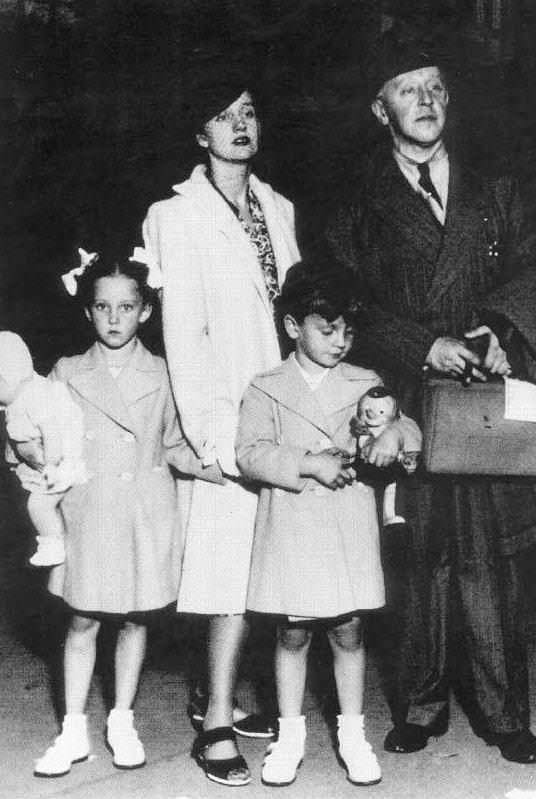
Figure 1.--Arthur is seen here at about 10-11 years of age in Berlin. He wears a suit with a large floppy bow. Note the curly hair. The photpgraph was taken bout 1898.


Figure 1.--Arthur is seen here at about 10-11 years of age in Berlin. He wears a suit with a large floppy bow. Note the curly hair. The photpgraph was taken bout 1898. |
Arthur was born into a family of middle-class Jews in partioned Poland. He showed an interest in music from his earliest days and would cry if taken out of the room with the piano. His talent was recognized at age 3. He first played the piano in public at age 7 and gave his last concert at age 89. He debuted in Berlin at age 13. His parents had some difficulty affording his musical lessons. Even so, unlike some other prodigies, there was no push to have him give extensive series of performances as a child. It was not until his 50s that the full scope of his musical genius was realized, in part because he neglected pratice as he enjoyed living the good life. He emmigrated to America. Few of his Polish relatives survived the Holocaust. He was a cosmopolitan of the first order. He spoke eight languages and lived in several different countries besides Poland and America, including England, France, Germany, Spain, and Switzerland.
Arthur was born into a family of middle-class Jews in partioned Poland. His father's parents had been killed by Russian shelling in the Polish national rising of 1863. His father, Izaak Rubenstein (1847- ) moved to Lodz in the 1860s, after the death of his parents. Izaak set up a small textile plant and in 1870 married his mother--Felucja Follman.
The Rubenstines had six children: Jadwiga (1871- ), Stanislaw (1872- ), Helena (1873- ), Franciszka (1877- ), Tadeusz (1878- ), and Ignacy (1880- ). They thought their family was complete. Seven years later Arthur arrived, he was an unwelcome surprise. His mother considered an abortion. They were going to call him Leo, but little Ignancy apparently wanted a musician for a brother and they settled on Arthur because of a local violinist they knew. [Sachs, p. 6.] Jadwiga in particular doted on her little brother.
Arthur was born in Lodz, Poland during 1887. At the time it was part of the "Congress Kingdom", a nominally autonomous entity awarded to the Tsar by the Congress of Vienna. Lodz was an industrial town and despite the Russian Government, the German influence was very strong. Artek as Arthur was called, as is so often the case with the youngest child, was a difficult, spoiled boy. He was a late talker. As an adult, however, he gave the impression that he never felt loved as a child, but more of an object. [Sachs, p. 14.] At about age 8 he witnessed a terrifying incident where the Tsar's police killed some local Polish nationalist agitators which affected him deeply. [Sachs, p. 16.]
We have little information on Artex's clothing. One little Belin Jewish girl remember's him playing the piano at a dinner party her parents gave. She describes, "... today's artost is ... still a little man ... with deep, dark eyes and curly, black hair. The brown velvet suit with white collar ... is really a little too big for him." Artek was about 12 years old at the time. His daighter claims that her father had pale blue eyes and aiburn hair [Sachs, p. 31.] He was probably about 10-11 years old at the time. Photohraphs at about this time show him wearing a floppy bow as well (figure 1). At about 13 years of age in 1900 he was wearing a kneepants sailor suit with dark long stockings. One biographer writes that at 13 he was becoming increasingly interested in girls, but still wearing sailor suits. He realized that only through his music could he get them to take him seriously. [Sachs, p. 37.] Whether this is the authots suposition or the wat Artek actually felt, I do not know.
Artek from his very ealiest years loved the piano. He enjoyed all music, but the piano was his instrument. He showed an interest in music from his earliest days. His parents bought a piano for his sisters, believing that respectable middle-class girls should play a little. Arthur was 2½ years old and immediately became attached to the instrument. In fact, he would cry and carry on if taken out of the room with the piano. He watched his sister receiving her lessions and soon began playing himself. He would play four hand with his sister and remembers that she played very badly. From this early beginning, there was no doubt in his mind that he wanted to be a musician.
Artek's talent was recognized at age 4 by Joseph Joachim. Joachim was the seventh son in a Hungarian Jewish family. He was a child violin prodigy. By age 14 he played under Mendelssohn's direction. Later he became associated with Liszt, Schumann, and Brahms. He preceived Arthur Ribenstein's talent when the boy was only 4 years old. He was not anxious to be bothered, apparently many parents with children of modest abilities consider them prodigies. On the trip to Berlin, Arthur remembered the "bemustached, jackbooted, saber-rattling pistol packing Russian border guards". Joachim took Artek him into his study and sang him a theme from Schubert's "Unfinished Symphony" and asked Artek to play it reproduce it on the piano. He even added Schubert's modulation which he thought evident. Joachim was impressed. Family accounts differ somewhat, but Arthur rembers getting a big piece of chocolate fron Professor Joachim. He advised Artek's not to force his development. Later in Life, Rubenstein was to relect that it is probably best not to give undue publicity to child prodigies because as adults they often can not live up to the expectations. Joachim also suggested he study the violin. Here Artek would have none of it. He smashed a small violin purchased for him. It was the piano that he wanted to play. [Sachs, pp. 9-10.]
Jan Kwast was a respected Russian conductor. Artek was taken to a concert in which Kwast's orchestra performed Grieg's "Peter Gyny". Artek was thrilled and when he returned home, to his parennt's amazement played almost all of it. Kwast was invited to dinner and was impressed when Artek played. He advised his parents to begin lessons right away. [Sachs, pp. 11-12.]

Figure 1.--Arthur is seen here at about 13 years of age in Berlin. He wears a white sailor suit with blacl long stockings. The photpgraph was taken in 1900. |
Artek's first piano teacher insisted he keep his elbows at his side and hold his hands still and just move his fingers so that a coin remained on his hands while playing scales. As with the violin, Artek rebelled. Another teacher was engaged, an Adolf Prechner. Apparently the two got on as Artek studied under him from age 4½-9½. While studying under Prechner, Artek met and became friendly with another slightly older child prodigy--Branislae Huberman. They became life-long friends. At age 9 Artek began his studies in Warsaw. He was left in the care of Aleksander Rozycki, but the lessons did not go well and he must have been home sick for his family. He complained that his teacher slept through his lessons and once had his son demand payment in adbance at the door. Rozycki decided he had little future as a muscican. Artek was brouht back home. It was at this time that hios father's business failed. His parents had some difficulty continuing his musical lessons. Even so, unlike some other prodigies, there was no push to have him give extensive series of performances as a child. There was no attempt to capitalize on him finacially. For a while he lived with his sister Jadwiga in the country. [Sachs, pp. 18-19.]
Finally it was decided to send Artek to Berlin where an aunt lived. His mother iun 1897 acompanied him to Berlin. After having difficulty placing him, Joseph Joachim who was assocaited with the Hochschule für Musick remembered him and after another audition agreed to under take his musical training and education. A family was found for him to live with and Artek was again on his own--this time in Germany. He was never to live in Poland again. In Berlin Rubenstein was tutored by a severe teacher, Heinrich Barth, who commonly brought his students to tears. Many withdrew. Artek stick it out either because his parents were too far away to run home to or becuse he was tougher and of course more talented than the other students. In later life Rubenstein was to credit Barth for making a musician of him. [Sachs, pp. 25-27.] Artek's studies in Berlin were financed by donations from wealth Jusish patrons. He would sometimes play the piano at their dinner parties.
Artek's maternal grandparenrs were practising Orthodox Jews. His parents had little iterest in religion. Lodz had a thriving Jewish comunity and many Jewish schools. Artek received, however, virtually no religious education. His father was, however, interested in Zionism.
The official language in the Congress Kingdom was Russian. From the age of 7 years he attended primary school which was conducted in Russian. Like the other Polish children, he resented this. At school they would sing the Russian national anthem. There was no Polish instruction. After school his sister Frania taught him to read and write Polish. He remembers enjoying the lessons and developing a love for Poland. He eventually learned to speak eight different languages (English, French, German, Polish, Russian, and Spanish), among which he did not count Yidish.
He first played the piano in public at age 7. It was a low-key local event in Lodz. What he remember most about it was the box of chocolates he received. [Sachs, p. 13.] He debuted in Berlin at age 13. Gradually his famed spread in Germany which caused the Polish musical world to take notice.
Rubenstein was in Enhland when World War I broke out.When France announced that they were forming a Polish legion, he traveled to Paris and got a job translating captured German documents. Finally he got a documernt indicating that his artistic performances were helpful to the war effort. He spent most of the War, however, in Spain and South America.
Rubenstein was certainly the greatest pianist of the 20th century, perhaps of all time. After giving his first public performance at age 7, he performed through age 89. We know of no musician with a longer career. Many young musicians in the late 19th century, influenced by Liszt and Leschetizky became romantic pianists. Rubenstein was certainly influenced by the romantics, but avoided the excesses and devdlopd a more modern sound.
It was not until his 50s in the mid-1930s, however, that the full scope of his musical genius was realized, in part because he neglected pratice as he enjoyed living the good life. His joie de vivre undoubtedly interfered with his key board work and mechanics of making music, but perhaps in the long run it played a role in deepening his love of music which he was able to convey to audiences. Therewas no doubt he had the mind of a magical musician. His keyboar mistakes were not from lack of talent. He was a spectacular technician depite lack of attention to practice. One could not help but thinking listening to his musc that the pianist and piano had fused into one glorious insyrument. He never lost the love affair with the piano that he developed in early chilhood. He was passionate about the piano and the music he played.

Figure 3.--The Rubenstein family is seen here arriving in Buenos Aires during 1940. The two olldest childen were Eva and Paul, both seen here. |
Rubenstein had four children. John the youngest became an actor. The children never remember him speaking kindly of his family in Poland. The children all agree that he was a very demanding father--insisting on the father being shown great respect. It was especially difficult for the two oldest children. His wife Nela said that her hisband had no real idea how ti raise children.
He emmigrated to America. Few of his Polish relatives survived the Holocaust. Most of his brothers and sisters and their children and grandchildren were killed by the NAZIs. Only a very few survived.
Sachs, Harvey. Rubenstein: A Life (Grove Press: New York, 1995).
Navigate the Historic Boys' Clothing Web Site:
[Return to the Main prodigy M-R page]
[Introduction]
[Activities]
[Biographies]
[Chronology]
[Clothing styles]
[Countries]
[Topics]
[Bibliographies]
[Contributions]
[FAQs]
[Glossaries]
[Satellite sites]
[Tools]
[Boys' Clothing Home]
